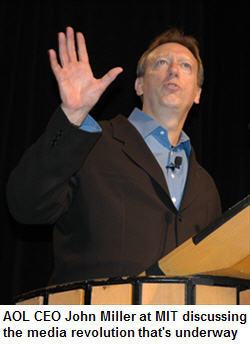AOL CEO Miller: The long tail is real, but only a handful are cashing in


At the heart of the revolution is the juxtaposition of growing choice (in terms of content quantity and sources) against the number of hours in the day which, despite our best efforts, never changes. Said Miller:
There are now 50 million blogs, hundreds of thousands of podcasts and we have all these different choices. Even with magazines, there were 9000 mag titles in 60's and now there are 17000 now. There's has been a huge explosion of choice which as made a huge difference in the landscape......But what hasnt changedis the number 24. The number of hours in the day to consume that media. What that means is that something has to give... There is real shift going on.
Miller reiterated what most of us already know; namely that people are changing their consumption and media habits. But he went on to share some of AOL's insight into those trends. Miller talked about how most people with Internet access either value the Internet as much as TV, or more than TV and how, the bottom line is that if people are spending more of their time online, and the number of hours in the day isn't changing, then that time is coming from other media. But, citing his 13 year old son as a perfect example, Miller said it's also not the same 24 hours anymore.
The first force that's changing the nature of fixed time is multitasking. While I've long argued that this is nothing new (for example, the dishwasher, washing machine, and dryer have done wonders for mutltitasking), Miller alluded to the fact that there's a whole generation of consumers coming up that are open to abosrbing multiple media streams simultaneously:
My 13 year old would go on line and, with instant messenger, he'd have 5 or 6 conversations going on at one time....He'd have a web site or two up, the TV would be on in the background, and if you asked him what he was doing, he'd say homework. Multitasking is a very real phenomenon and the young folks are gettig there first.
The second two forces he discussed in unison were compression and time-shifting. He cited how we're using our TiVo boxes to take the commercials out our TV shows, reducing 1 hour programs to 40 minute shows. But another element of compression is the abilty to zero in on highlights. For example, now, you don't have to watch 90 minutes of SNL to see the really funny parts. For that, you just go to YouTube. Miller concluded that it's not just about multitasking, but now, it's also about "snacking" and "multitasking."
Not suprisingly, the underlying fomenters of the media revolution underway, according to Miller are:
- broadband penetration
- search
- distribution
- low cost of development
- growth of video consumption on line
No surprises there. But Miller made a good point about how the value in of broadband penetration is more about the always-on nature of the Internet than it is of the performance. With Internet-based consumption of content experiencing explosive growth (at the expense of other media), the number of content sources has created a hugely fragmented landscape that has made the "long tail" an undeniable reality for media companies. Miller pointed out that he wasn't just referrring to old or traditional media, but also to the so-called new media companies like Yahoo and AOL:
The top Web sites represent less of the consumption... Even new comapnies like AOL and Yahoo represent less of the consumption....It's not just old media vs. new media.. It's everywhere... the Long tail has come to all of media. It has become a true long tail business in all of its forms.
Miller also noted the effects of the consumer being in charge and how that's affecting the industry in very significant ways. He cited the mashup phenomenon (not software,..but mashing of content) saying:
Take the Colbert Report.. people are invited to take that and make it their own.... consumers are part of the creative and distribution process in a way they've never been before.
That taken in combination with the viral effect of communities, according to Miller, is changing (perhaps wiping out) traditional marketing:
The old way of getting your video used and seen was that you'd spend a lot of lot of money on marketing. But companies like YouTube have no marketing budget. It's the product that drives adoption. The consumers drive adoption..... it's about whether they choose or not to pass it on to their friends.. not I'm sure you can spend your way there. That said the old media is not sitting still....they're saying "we're in the game" no and asking "what will we do?"
But the one point Miller made that you don't here getting discussed to often is how, unlike with other industry's where there has been similar revolution and explosive growth in the distribution and suppy chains, there are still just a handful of companies monetizing (getting rich) off that growth. If you follow the money, said Miller, you'll still find old companies like Google (now eight years old), Yahoo, AOL, eBay, and Microsoft at the end. Their staying power, asserted Miller, means they'll be around for a long time, as will be many of the older traditional media companies who have the similar capacity to use their size and scale to intercept the dollars that go along with media consumption.
Miller went onto say that it'll probably stay that way because any player that rises to a certain scale will get swept up through consolidation. Asked Miller:
Does anyone beleive YouTube will be independent in 5 years?
Good point. So, while a few innovators (and their startup crews) will have some extra change in their pockets, the majority of the money is still flowing to the same place. Will that get revolutionized? Who knows?